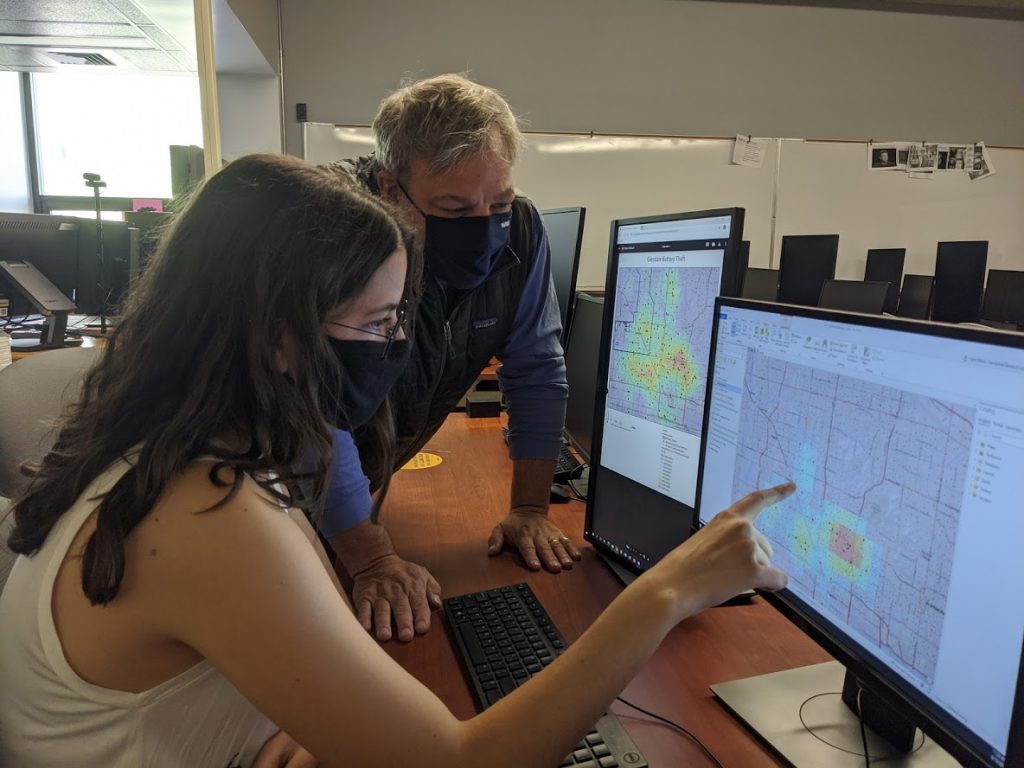Claire Simchuk spent her first year at Northern Arizona University fighting crime from her computer using spatial statistics and geographic mapping.
The research project the now-second year NAU student did for Cox Communications was to track and analyze the theft of batteries from emergency cable boxes in the Phoenix metro area, which the communications company needs to keep their connections running and allow 911 calls to go through. It was a perfect combination of her two majors—criminology and criminal justice and geographic science—and great preparation for the work she wants to do after she graduates.
“After I graduate, I would love to become a crime analyst and combine my knowledge of GIS, criminology and statistics to analyze crime trends and act upon that data,” she said. “This opportunity was incredibly similar to that goal, where I was able to take information from the field, use analytics to predict and then act upon that.”
Simchuk, who is from Redlands, California, learned about the research opportunity from Mark Manone, chair of the Department of Geography, Planning and Recreation at NAU. The two met last year during Geography Awareness Week, where Simchuk shared her dual majors and post-graduate plans. When Cox Communications contacted Manone for a research project that would look into a crime ring that was stealing batteries from emergency cable boxes, he reached out to Simchuk.
For this work, Simchuk used the location and address data to do a spatial analysis of the thefts to predict where future thefts might occur. She geocoded the addresses of all the boxes and the locations of all thefts into mapping software ArcGIS Pro and ran a density analysis to see if she could find hotspots. By separating the data into recent thefts and evaluating areas where more thefts were reported, she predicted where future thefts were likeliest to occur. Those analyses included addresses of the boxes that were at higher risk.
From there, Cox technicians performed their own analysis on what she sent, narrowing down the areas of higher risk even further. They then used her information to install dummy batteries with GPS devices to track the battery and alerted police, employees and customers in the areas most likely to be affected. This laser focus contributed to at least one person being arrested for theft.
“Undergraduate research experience and internship opportunities are such an important component of our undergraduate degree program,” Manone said. “This gives students the opportunity to work with real data in a real-world setting and gain insight into what a career might look like and, more importantly, gain confidence in what they are learning and where their education is coming from. These opportunities will be the difference-maker in a student’s ability to land a job after they graduate as well as help them determine if this is the path that they want to travel.”
Because Simchuk was so early in her academic career, she went into this research without familiarity with ArcGIS Pro. She’d just started a related class, but didn’t know much about how to use the software. Manone gave her some basic direction and she learned those steps and then the next steps, teaching herself as she went. Now that she’s in classes to learn ArcGIS Pro, her experience has been a boon.
“While I may not know the specific terms, I still have more than just a base knowledge of ArcGIS Pro that has made these classes just deepen my knowledge and make me better at using the program,” she said.
Geography students interested in doing undergraduate research can contact the Geospatial Research and Information Lab (GRAIL), which provides opportunities on a variety of projects. Some current projects include FloodAware, St. Mary’s Food Bank, the NSF Power of Data Project, NAU’s Office of Alumni Relations, Cox and the NAU LGBTQIA Commission.
Heidi Toth | NAU Communcations
(928) 523-8737 | heidi.toth@nau.edu




